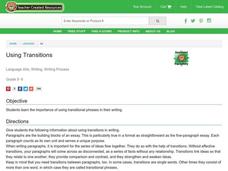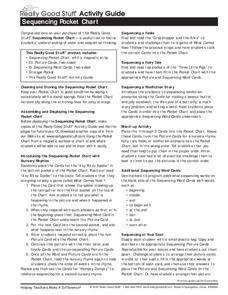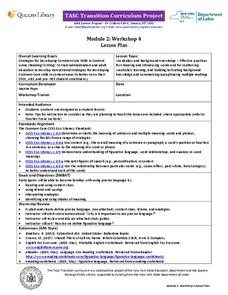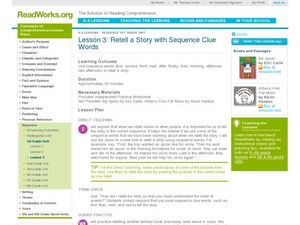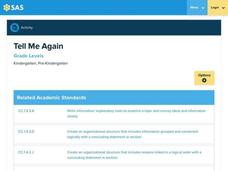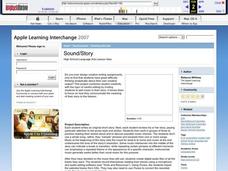Curated OER
Using Transitions
Young scholars explore the importance of using transitional phrases in their writing. They discuss why transitions are important to their writing and various types of transitions that they can use. Students practice using transitions in...
Curated OER
Transitive/Intransitive Verb Practice
In this transitive and intransitive verbs practice worksheet, students read an informative lesson. Students then respond to 10 questions that require them to identify verbs and label them as transitive or intransitive.
Curated OER
Speak Up for Recycling
Are you looking for ways to enhance a persuasive writing or speech unit? Use this lesson plan to prompt your young writers to investigate a school recycling program. After conducting research, they present a persuasive, well-organized...
EngageNY
Revising for Organization: Timely Transitions
During the eighth lesson in a historical fiction unit, pupils practice thoughtfully transitioning their ideas sequentially. After the teacher models how to add these transitions using the Wheelwright draft created in a previous lesson,...
EngageNY
Whole Class Model Letter Writing: Organizing Reasons and Evidence and Using Transition Words
Where's the evidence? Scholars practice ordering the evidence and reasons for their class opinion papers by physically sorting them. Next, they work collaboratively to write a body paragraph, using linking words to connect their ideas...
New York State Education Department
TASC Transition Curriculum: Workshop 11
You'll C-E-R a difference in classroom achievement after using a helpful lesson. Designed for economics, civics, government, and US history classes, participants practice using the CER model to craft arguments about primary and secondary...
Curated OER
Order! Order!
Polish organization skills in your youngsters. With this lesson, they are introduced to the trait of organization and participate in activities that reinforce organization. They cut apart a familiar story, receive different...
Curated OER
Comprehension Instructional Routine: Sequence of Events in Text
If you're looking for a detailed lesson on event sequencing from informational text, you've found it. There is an entire script for you to draw from as you explore order of events and sequence words. Scaffolding is key here; learners...
EngageNY
TASC Transition Curriculum: Workshop 15
What do a cheetah, Audi commercial, and air have in common? They're all topics of an engaging inquiry-based, hands-on workshop for educators about background knowledge, reading strategies, the CER model, and argumentative writing. The...
Really Good Stuff
Sequencing Pocket Chart
Cut it out! Beginning readers practice sequencing skills at home or at school with a variety of activities that require cutting out multiple sets of picture cards and putting them in the correct order.
Ware County Schools
Simple Directions
When teaching someone how to do something, it's important to give clear directions. Your youngsters can practice their skills by completing these worksheets meant to help learners describe the steps in a process. It's not just any...
New York State Education Department
TASC Transition Curriculum: Workshop 4
Why is it important to use precise language? Participants explore this question in the fourth activity in a series of 15 on effective instruction. Perfect for all content areas, the activity promotes appropriate language choice through...
Curated OER
Sequence, Predict, Infer: Pink and Say
Practice sequencing with your 2nd graders via Patricia Polacco's Civil War book Pink and Say. Begin with a blindfold and a bag of mystery items. Connect their use of clues to identify what they can't see with the skill of making...
Curated OER
Lesson 3: Retell a Story with Sequence Clue Words
First graders evaluate sequence words. In this order of events lesson, 1st graders practice using sequence words to retell a story. They do guided practice with the teacher retelling a story they have read as a class and then try it...
Virginia Department of Education
Maintaining Organization, Clarity, Central Idea, and Unity
Introduce and challenge the essay organization skills of your junior high writers with the paper reconstruction activity in this demonstration. Theydetermine what the word organization means, and discover the basic organizational...
Curated OER
The Personal Narrative - Part 3
Let's peer edit! Have your writers exchange their personal narratives with another learner! While peer editing, they will look for any missing information and identify strong details. They can practice literary analysis skills using a...
Curated OER
Reading Skills: Chunking
Prepare advanced English learners and low-level readers for the reading demands of post-secondary education with skill of chunking. Readers learn to make meaning from phrases rather than individual words, helping them to read more...
Curated OER
Sequence Clue Words (part 2)
If you've already discussed using sequence words to determine the sequence of events in a story, then a follow up lesson is definitely in order. They read the story, My Apron by Eric Carle and look at the sequence clue words such as...
Curated OER
Introduce Vocabulary: Kindergarten Count to 100 (Rogers)
Combine counting and vocabulary in context using Jacqueline Rogers' Kindergarten Count to 100. Suggested words for this text are: first, fountain, salute, second, and third. By introducing the terms before reading the text,...
Pennsylvania Department of Education
Tell Me Again
Students demonstrate how to retell a story in sequential order. In this reading comprehension instructional activity, students listen to a suggested read aloud, such as Little Boy Blue. Additionally, students practice retelling the story...
Curated OER
English Vocabulary Skills: Friends
Students practice their English vocabulary skills. In this friends vocabulary instructional activity, students review words regarding friends and act out an English speaking scene.
Curated OER
Socializing at Work
Students practice social conversation using adjectives and phrases describing good and bad weather. They review the present perfect continuous, present continuous, past continuous and future continuous tenses.
Curated OER
Do You want? Do You Like? There is/ There are
Pupils understand and recognize the names of various foods. For this food bingo lesson, students work in pairs to practice questioning with the phrases: do you want and do you like. Pupils practice listening and speaking skills while...
Curated OER
Sound/Story
Students combine creativity with the rigor of careful editing by adding music to their story. It forces them to focus on how they communicate the meaning of their story to the listener.
